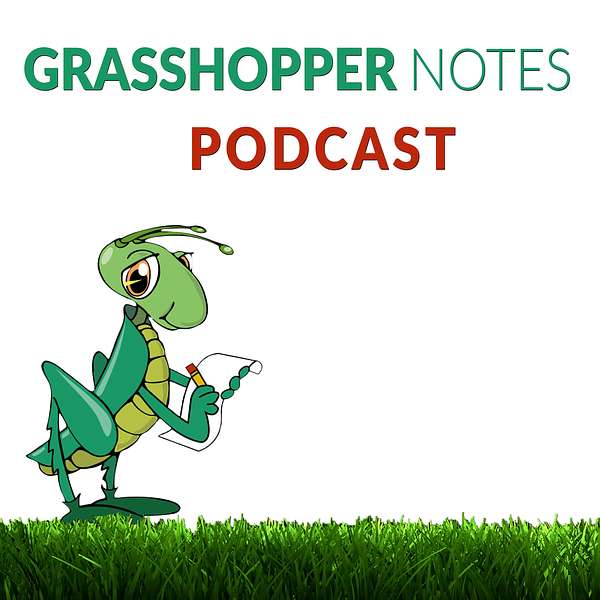
Grasshopper Notes Podcast
The Grasshopper Notes Podcast is hosted by John Morgan the man who has been billed as America’s Best Known Hypnotherapist.
John’s podcasts are a collection of guided meditations and bite-sized, mini podcasts which open you to new ways of thinking, communicating, and responding. You get a finer appreciation of how your mind works and how to use your internal resources to your best advantage.
See a video of John's background at the following link: https://www.youtube.com/watch?v=XbCPd00ok0I
In short, John Morgan is a people helper. Explore this channel and see what he can help you discover.
Grasshopper Notes Podcast
Regrets Or Reflections?
Use Left/Right to seek, Home/End to jump to start or end. Hold shift to jump forward or backward.
How to turn regrets into reflections and avoid the pain.
Grasshopper Notes are the writings from America's Best Known Hypnotherapist John Morgan. His podcasts contain his most responded to essays and blog posts from the past two decades.
Find the written versions of these podcasts on John's podcasting site: https://www.buzzsprout.com/1628038
"The Grasshopper" is the part of you that whispers pearls of wisdom that seem to pop into your mind from out of the blue. John's essays and blog posts are his interpretations of these "Nips of Nectar." Others have labeled his writings as timeless wisdom.
Most of the John's writings revolve around self improvement and self help. They address topics like:
• Mindfulness
• Peace of mind
• Creativity
• How to stay in the present moment
• Spirituality
• Behavior improvement
And stories that transform you to a wider sense of awareness that presents more options. And isn't that what we all want, more options?
John uploads these podcasts on a regular basis. So check back often to hear these podcasts heard around the world. Who wants to be the next person to change?
Make sure to order a copy of John's new book: WISDOM OF THE GRASSHOPPER – 21 Days to Creativity. These mini-meditations take you inside where all your creative resources live. And you'll come out not only refreshed but recommitted to creating your future.
It's only $16.95 and available at BLURB.COM at the link below. https://www.blurb.com/b/10239673-wisd...
Also, download John's FREE book INTER RUPTION: The Magic Key To Lasting Change. It's available at John's website https://GrasshopperNotes.com
Regrets or Reflections?
Ever lie awake at night replaying something awkward you did 10, 20, 30 years ago? Yeah—welcome to the club.
But here’s the twist: what if those cringey flashbacks aren’t regrets . . . but just reflections waiting for a better narrator?
There’s a powerful idea from the world of Neuro-Linguistic Programming called reframing. It’s all about shifting your perspective to find a more helpful way of looking at things.
Take this, for example. You might say, “I’m so tired of all this rain.” That’s the refrain. But the reframe? “Well, at least it’s helping ease that drought they were predicting.” The rain hasn’t changed—but how you see it has.
And that’s the point: regrets are just perceptions. But when you reframe them as reflections, everything starts to look a little different.
Reflecting gives you a chance to revisit the past without reliving the pain. Regret, on the other hand, is like trying to rewrite history—and let’s be honest, no one’s pulled that off yet.
Think of it this way: the only real thing regret and reflect have in common is that they both start with “R”. . . and they rhyme.
Turning regrets into reflections is a habit you can build. Here’s a simple, little exercise to help make the point:
Grab a plastic cup, fill it with water, and set it next to your sink. Then knock it over on purpose. Now—quickly try putting all the water back in the cup before it runs down the drain.
You can’t, right? It’s a little ridiculous. And so is trying to undo the past.
Instead, try this: Picture yourself going back to that moment you regret—but show up as the wiser, older version of yourself. Talk to the younger you. Let them know, yes, there are consequences—but regret won’t get them where they want to go. Learning will.
The more you do this, the more natural it becomes. Over time, you start to grow out of that reflex to regret—and grow into the habit of reflecting instead.
It’s a powerful tool. But like any tool, it only works if you use it.
And as the Brits say, give it a go—and see what happens. After all, only a guitar works better by having a fret.
All the best,
John
